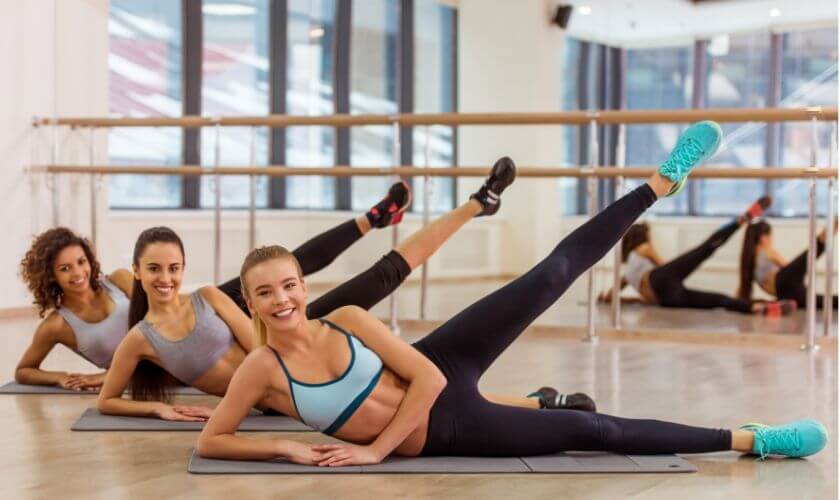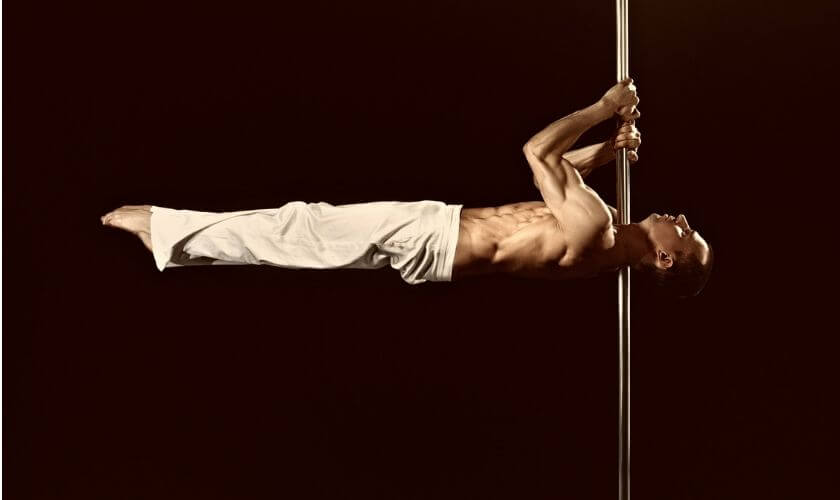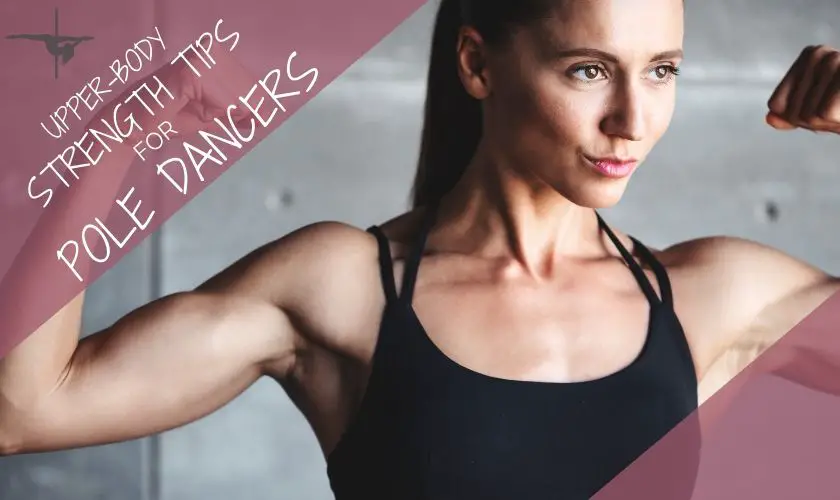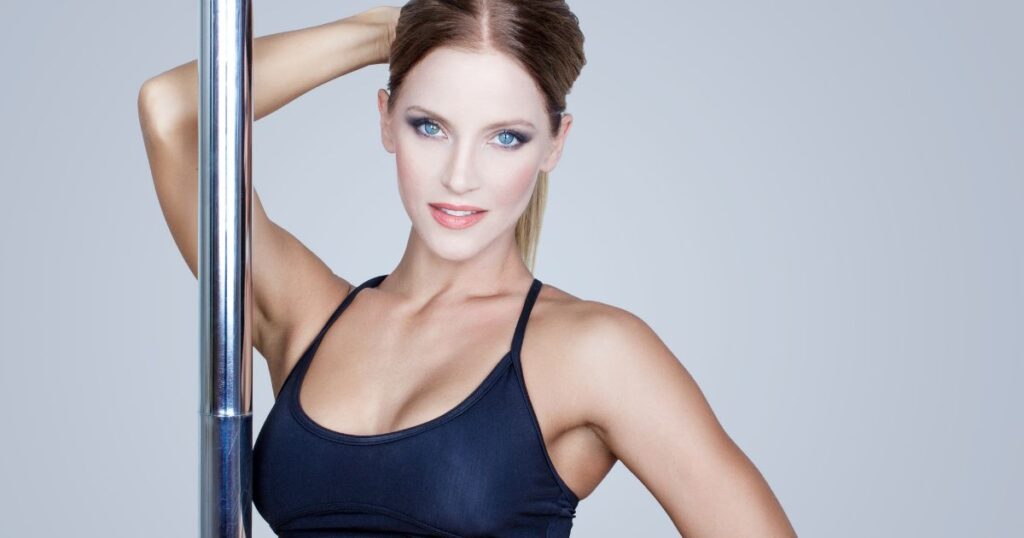Last Updated on December 17, 2022
Contents
- Why is it so Important for Pole Dancers to Warm Up?
- What Happens if you Don’t Warm Up?
- Does Stretching on its own Count as a Warm-Up?
- The Perfect 10-Minute Warm-Up for Pole Dancers
- Want to become an amazing pole dancer?
In this article, you will learn about:
- The importance of warming up before starting your exercise
- How to prevent injuries
- A simple 10-minute warm-up routine suitable for pole dancers of all levels
Why is it so Important for Pole Dancers to Warm Up?
When you warm-up, you’re slowly increasing your heart rate and body temperature, which causes a better blood flow to your muscles. Any experienced pole dancers will tell you that it’s common to ache for a few days after a class or pole workout session, however, we can lessen these aches by warming up.
What Happens if you Don’t Warm Up?
If you don’t warm-up before exercise, you’re increasing your chances of injuring yourself during your pole dance session. You may also find that your muscles ache more than usual the following day. Also, if you attempt to stretch too far when your muscles are cold, it becomes very easy to pull a muscle, which would mean laying off the pole dancing for a few weeks, and none of us wants that!
Does Stretching on its own Count as a Warm-Up?
No. Stretching is something which you should focus on after your workout. When your muscles are warm, it’s easier for them to stretch to the extremes with a lower risk of hurting yourself. That said, some light stretching during your warm-up can be very beneficial…
So, here it is… A lot of work has gone into creating this guide, so if you find it useful don’t forget to share this post with your friends and other pole enthusiasts 🙂
The Perfect 10-Minute Warm-Up for Pole Dancers
Want to become an amazing pole dancer?
Open Dance Academy has over 450 online lessons, by some world famous pole dancing champions! Join now to get:
***GET 10% OFF OPEN DANCE ACADEMY***
Use the code polefitfreedom to get 10% off Pole Dancing Lessons with Open Dance Academy. This is an exclusive offer for readers of this blog!
Phew… let’s begin!
Light Cardio – 2 Minutes
The first thing to do as part of your pole dancing warm-up is to gently increase your heart rate. This could be anything that you feel comfortable with, as long as it makes you feel warm!
Here are some creative ideas for your 2 minutes of light cardio as part of your pole dancing warm-up:
- Punch the air with your arms while jogging on the spot
- Jumping Jacks
- Skipping (skipping rope optional. If you don’t have one – just pretend!)
- Medium-paced aerobics
- Step aerobics
- Stationery exercise bike
Get as creative as you like here, we like to alternate between different things as part of our warm-ups, for example, we’ll do 20 seconds of jumping jacks, followed by 20 seconds of jogging on the spot, followed by 20 seconds of skipping, then repeat.
Remember not to push yourself too hard for this two minutes, you’re only warming up! At the end of this two minutes, you should feel your heart beating faster than when you started.
Medium-Paced Cardio – 1 Minute
For the next 60 seconds, doing the same activity/activities as above, but increase the pace – go twice as fast as you were for the first two minutes.
By the time the 60 seconds are up, you should feel noticeably warmer, if not a little sweaty!
Trust us, your body will thank you for easing yourself into workout sessions rather than just getting straight to it.
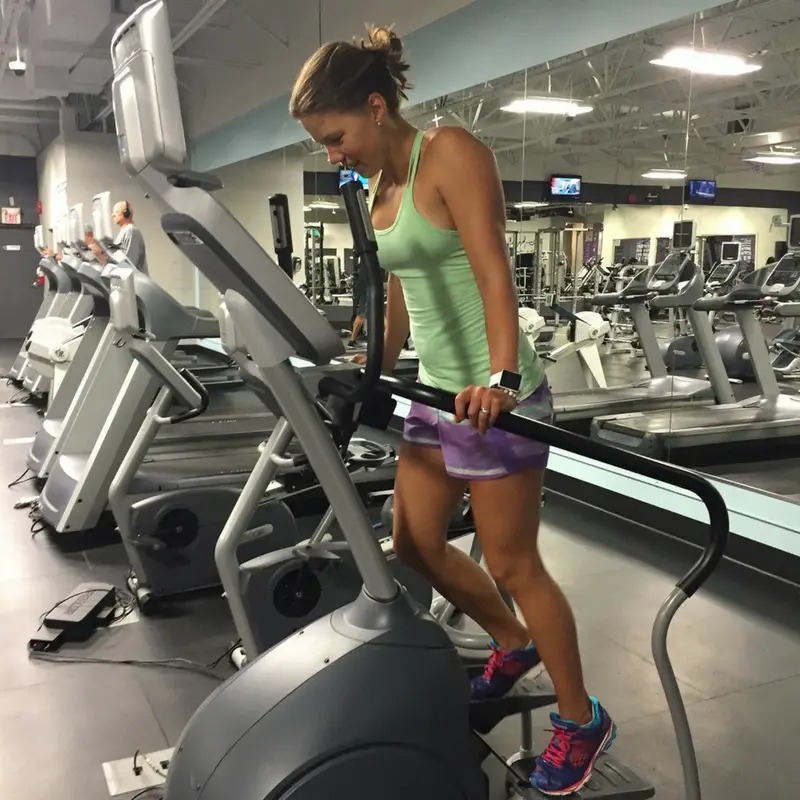
Joint Rotations – 3 Minutes
Pole dancing is a full-body workout and, if we’re not careful, it can put a lot of stress on our joints and cause premature wear-and-tear.
So, to alleviate this, let’s gently warm-up all of our joints before we start our pole fitness session.
Work from head-to-toe and gently rotate all of your joints:
- Slowly rotate your neck around in large circles, relax your neck as you do so, then switch directions
- Roll your shoulders backwards, then switch directions and roll them forward
- Hold both your arms straight above your head, pointing at the ceiling; swing your arms forward in large circles, then change directions and make backwards circles as if you were swimming backstroke
- Try to make the same big circles with your arms but with one arm swinging forward and the other swinging backwards (this is definitely harder than it sounds!)
- Hold your arms out straight in front of you, slowly twist your wrists in each direction
- Put your hands on your hips and make large circles with your hips as if you were hooping with a very slow hula hoop! Remember to do this in both directions.
- Hold on to your pole or door frame for support for this. While standing up straight, have the pole or door frame at your side and bend one knee up towards your chest and then extend your knee upwards, with the aim of pointing your toe towards the ceiling. Then, return your leg to its starting position and repeat a further 8-10 times. It’s important not to ‘flick’ or ‘kick’ your knee out – this should be a slow and controlled movement.
- Using the same leg, keeping the pole on your side, raise your foot off the floor slightly and point your toes down. Draw imaginary circles in the air with your toe, with each circle getting larger. Then – you’ve guessed it – change directions!
- Still on the same leg, slowly make large circles with your ankle in each direction
- Repeat steps 7-9 using the other leg
Related: Is ‘Twisted Grip’ Bad for you?

Pole Conditioning: Crunches/Sit-ups – 1 Minute
Ensure you have the correct technique for proper crunches. As an instructor, it’s so common to see poor form when observing crunches. You should not be pulling on your neck in any way – to avoid this, try staring at a fixed point on the ceiling and don’t let your head drop back.
Do not rush through your crunches, it’s not a race to get them done quickly as you have to carry on for the full 60 seconds. Do your crunches slowly and meaningfully, we would expect to do about 20-25 crunches during this time.
Pole Conditioning: Squats – 1 Minute
Again, proper technique is important for doing squats effectively. You should let your booty ‘drop back’ as if you’re about to sit on the toilet! And, don’t let your knees go over your toes. Squats should be backward, not forward! With practice, your balance will improve.
As with the crunches, there’s no need to rush these squats – doing them slowly will have a better impact on your core strength.
Pole Conditioning: Plank – 1 Minute
For the next 60 seconds of the warm-up, try holding a plank without giving up! You can do this by resting on your elbows/forearms (bent arm plank), or with your palms down (straight arm plank), make sure you keep your butt low and body as straight as possible in both of these variations.
You should feel this in your upper arms and your core, which also just so happen to be the main muscle groups we work when doing pole dancing!
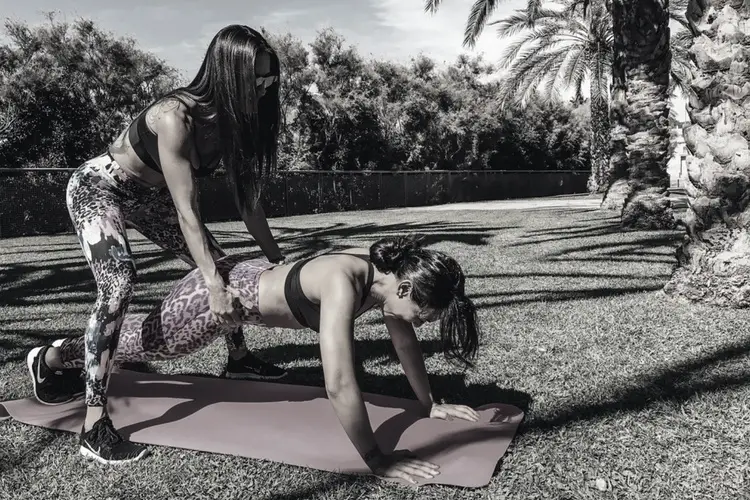
Related: How to get Upper-Body Strength for Pole Dancing
Light Stretching – 1 Minute
For the final minute of this warm-up, you’ll be gently stretching the muscles you’ve just worked. As deep stretching will come as part of the cooldown, you only need to hold each of these stretched for a few seconds.
- Start by stretching your arms across your chest, and then stretch your wrists out in front of you.
- Next, stretch your lower back and stomach by alternating between the cat/cow yoga poses.
- Stretch your calves by putting your palms down on the floor, walk your legs backwards and when you feel a stretch, try to push your heels into the floor.
- Stretch your hamstrings by sitting in a straddle position (sit on the floor with your legs in a V shape) and slowly lean forward – try to get your elbows down on the floor.
- Stand up to stretch your neck by letting it drop to one side, providing a small amount of resistance with your hand.
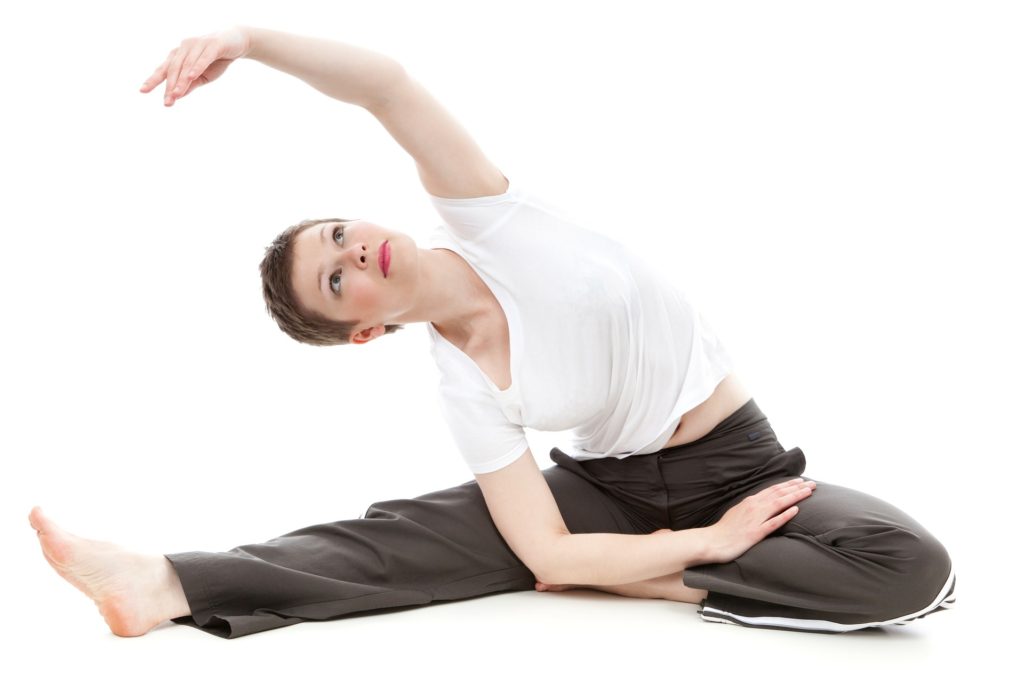
Total: 10 Minutes
And there you have it! You should now be completely warmed-up and ready to nail your pole practice! This energetic and motivating playlist should help you get in the mood for working out!
What’s your favorite pole warm-up routine? Leave a comment below to join the conversation 🙂
Pin this Post
Pin this image to save this guide:
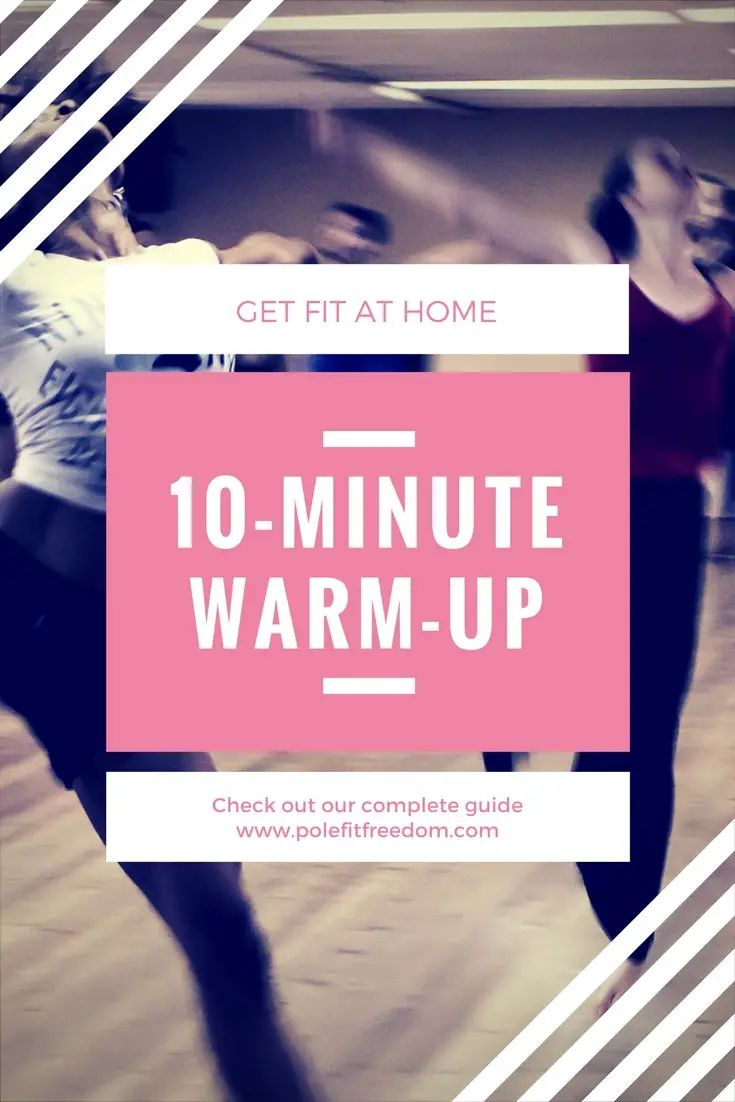
Happy poling!

